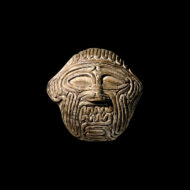Callaghan asks the question “What’s your all-time favourite moment in a TV show?”
Spoilers for Ultraviolet follow. That’s the 6-episode TV series written and directed by Joe Ahearne, not the film of the same name.
There are vampires. You can’t record a vampire on video or audio tape. An elite team has been set up to stop them.
Michael was a detective.
Vaughan was a soldier.
Pearse was a priest.
Angie was a doctor.
Pearse has been diagnosed with cancer by Angie, and the prognosis isn’t good. He hasn’t told anyone. A prisoner has surrendered and is being interrogated – someone who also had cancer and crossed over.
Michael is in love with Kirsty. She’s hiding out with Jacob, a vampire, and believes Michael to be part of a death squad. Jacob blackmails Michael to smuggle out vampire remains from the HQ. Otherwise Kirsty will be killed – or worse.
Vaughan confronts Pearse, who dismissed the guards from the cell and spent 45 minutes talking to the vampire. Pearse won’t tell Vaughan what they discussed.
And off we go:
The music kicks in, strong in the background as Vaughan leaves the office and walks to the interrogation room. Observes the prisoner through the one-way mirror. Gets the tapes out and listens to them.
Pearse leaves the office. He walks down a dark street, alone with his thoughts.
Vaughan goes to Pearse’s office. Starts searching it.
Angie cuts open the prisoner. He’s still undead – and aware. Michael watches through one-way glass.
Michael enters the vault where they store the dust of neutralised vampires. Searches the database and starts over-riding the security system.
Vaughan continues to go through Pearse’s office, taking it apart, throwing files and papers everywhere.
Pearse enters a church. The confession box is full, and there’s a queue. He takes a seat and waits.
Michael opens a tube in the vault. Fetches the dust of a neutralised vampire from it.
Vaughan finds the drugs for Pearse’s cancer. The label shows they were prescribed by Angie.
The confessional box. The other side slides open and Pearse says “Bless me father, for I have sinned.”
Cut to commercial break. Two minutes and fifty-four seconds without a word of dialogue other than the beginning of Pearse’s confession.
And yet at every single point in this sequence, we know what’s going through the mind of each character.
Sue Hewitt’s fantastic music drives the piece – echoing the main theme with an organ for a few moments as Pearse sits in church, contemplating the things he’s talked about and waiting for the confession box to come free.
Every image tells you what’s going on, without a word being said.
And that’s why it’s so good.


